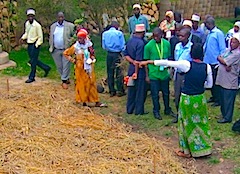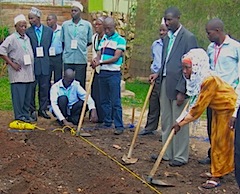| |
|
 |
Islamic Farming introduced to Uganda
September 2, 2014:
 |
 |
 |
The Islamic Farming practice of covering soil with mulch being discussed during the two-day workshop |
Get your free Islamic Farming Manual here.
There are fifty million microbes to be found in a single tablespoon of soil – that was just one of the fascinating facts revealed at a two-day training workshop introducing conservation agriculture based on Islamic teaching and scriptures to Uganda for the first time.
And the farmers, faith leaders, teachers and professionals attending acknowledged that, as Muslims, it is their responsibility to care for such creatures by carrying out good agricultural practice.
Though it has been scientifically proven that conservation agriculture can double yields within five years it was the faith component that gave the greater impetus for the Islamic Farming training event in Kampala in August 2014. For example, one participant quickly understood the value of using crop stubble for mulching instead of burning it, stating that in Islam ‘it is haram [forbidden] to burn living things’.
Improved yields and a richer quality of lifeARC project manager and former farmer Sam Adams said: ‘The Islamic Farming curriculum was piloted and launched in Kenya in January 2014. As 80% of Ugandans depend on agriculture for their livelihoods, it is ARC’s hope that the training will contribute to improved farming practices that bring environmental conservation together with improved yields and a richer quality of life for small-scale farmers and their families.’
Organised by ARC and our Ugandan partners, the training began with teaching from the Qur’an on the importance of caring for creation. This teaching was then applied to agriculture by showing participants how conventional agricultural approaches are damaging Allah’s creation. Artificial fertilisers and pesticides, combined with monocropping and ploughing, decrease soil fertility and result in lower yields and environmental degradation.
 |
 |
 |
Delegates at the Islamic Farming training workshop in Kampala, Uganda, try their hands at digging planting holes |
Instead, Islamic Farming recommends techniques found in conservation agriculture that care for Allah’s creation and, at the same time, improve yields, nutrition and income. Ploughing is replaced with individual planting holes, crop stubble is used as mulch rather than burnt, and organic practices such as companion planting and crop rotation naturally increase soil fertility and enhance pest and disease resistance.
The workshop was a mixture of classroom teaching and outdoor practical learning. An example ‘farm’ was planted, where Islamic Farming techniques were put into practice. This enabled participants to see the major differences between Islamic Farming and their current traditional farming practices.
Taking the idea forwardSam Adams said: ‘As the participants completed the training, they were asked what they would do with their new insights and learning. It was encouraging to hear many say they would experiment with the training on their own land. Others went further, promising to set up a demonstration farm, as has been completed on ten Muslim sites in Kenya. Muslim farmers in Uganda now have the opportunity and the training to adopt conservation agriculture methods that are motivated by their faith and will ensure the sustainability of their farms for future generations.’
After the workshop Mr A. Kinobe from the Uganda Muslim Journalists’ Association pledged: ‘In our weekly meeting with fellow Muslim journalists, I will explain to them what transpired in the workshop and encourage them to practice Islamic Farming.’ And Mr Ntege Abdullah from the Uganda Muslim Teachers’ Association said he would ‘plan a training for secondary teachers in urban schools before December’.
Read more about Islamic Farming
Get your free Islamic Farming Manual
|
 |
 |
|
|
|
|
|

